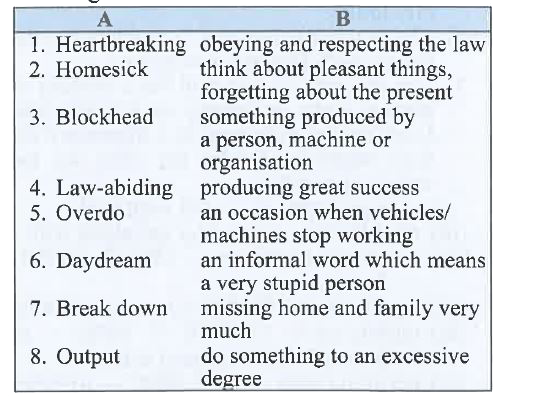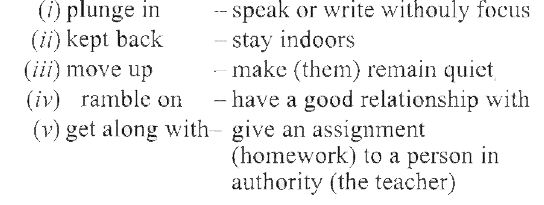Complete Solutions to NCERT TEXTBOOK QUESTIONS SOLVED (THINKING ABOUT LANGUAGE) of chapter FROM THE DIARY OF ANNE FRANK of Class 10 book with complete answers and questions
| Class 10 | ENGLISH |
| Chapter | FROM THE DIARY OF ANNE FRANK |
| FULL MARKS | NCERT TEXTBOOK QUESTIONS SOLVED (THINKING ABOUT LANGUAGE) |
| Number Of Questions | 20 |
| Academic Year | 2023-24 |
Match the compound words under 'A' with their meanings under 'B'. Use each in a sentence.

View SolutionThe text you' ve just read has a number of phrasal verbs commonly used in English. Look up the following in a dictionary for their meanings (under the entry for the italicised word).
(i) Plunge (right) in
(ii) Kept back
(iii) ramble on
(iv) get along with
View SolutionNow find the sentences in the lesson that have the phrasal verbs given below. Match them with their meanings. (You have already found out the meanings of some of them.) Are their meanings the same as that of their parts? (Note that two parts of a phrasal verb may occur separately in the text.)


View SolutionDo you know what it means to let the cat out of the bag ? Can you guess ?
View SolutionHere are a few sentences from the text which have idiomatic expressions. Can you say what each means? (You might want to consult a dictionary first.)
Our entire class is quaking in its boots.
View SolutionHere are a few sentences from the text which have idiomatic expressions. Can you say what each means? (You might want to consult a dictionary first.)
Until then, we keep telling each other not to lose heart.
View SolutionHere are a few sentences from the text which have idiomatic expressions. Can you say what each means? (You might want to consult a dictionary first.)
Mr. Keesing was annoyed with me for ages because I talked so much.
View SolutionHere are a few sentences from the text which have idiomatic expressions. Can you say what each means? (You might want to consult a dictionary first.)
Mr. Keesing was trying to play a joke on me with this ridiculous subject, but I'd make sure the joke was on him.
View SolutionHere are a few more idiomatic expressions that occur in the text. Try to use them in sentences of your own.
caught my eye
View SolutionHere are a few more idiomatic expressions that occur in the text. Try to use them in sentences of your own.
he'd had enough
View SolutionHere are a few more idiomatic expressions that occur in the text. Try to use them in sentences of your own.
laugh ourselves silly.
View SolutionHere are a few more idiomatic expressions that occur in the text. Try to use them in sentences of your own.
can't bring myself to
View SolutionYou have read the expression not to lose heart' in this text. Now find out the meanings of the expression using the word 'heart'. Use in a sentence of your own.
break somebody's heart
View SolutionYou have read the expression not to lose heart' in this text. Now find out the meanings of the expression using the word 'heart'. Use in a sentence of your own.
close/dear to heart
View SolutionYou have read the expression not to lose heart' in this text. Now find out the meanings of the expression using the word 'heart'. Use in a sentence of your own.
from the (bottom of your) heart
View SolutionYou have read the expression not to lose heart' in this text. Now find out the meanings of the expression using the word 'heart'. Use in a sentence of your own.
have a heart
View SolutionYou have read the expression not to lose heart' in this text. Now find out the meanings of the expression using the word 'heart'. Use in a sentence of your own.
have a heart of stone
View SolutionYou have read the expression not to lose heart' in this text. Now find out the meanings of the expression using the word 'heart'. Use in a sentence of your own.
your heart goes out to somebody.
View SolutionFind in the text the contracted forms that stand for two different full forms , and say what these are .
View SolutionYour teacher will read out an extract from The Diary of Samuel Pepys about the great fire of London. As you listen complete this summary of the happenings.
Summary
This entry in the diary has been made on ............(i)........... by ..............(ii).......... . The person who told Pepys about the fire was called .............(iii)............ She called at ..........(iv)........... in the morning. Pepys went back to sleep because .............(v)............ Pepys rose again at ............(vi)............ in the morning. By then about ..............(vii)............ houses had been burned down. The fire had spread to.............(viii)............ by London Bridge. Pepys then walked to the..........(ix)........... along with Sir J. Robinson's ............(x)............... .
View Solution
NCERT TEXTBOOK QUESTIONS SOLVED (THINKING ABOUT LANGUAGE) questions and complete solutions for chapter FROM THE DIARY OF ANNE FRANK of FULL MARKS ENGLISH (HINGLISH) of Class 10
All Exercises from FULL MARKS Class 10 ENGLISH FROM THE DIARY OF ANNE FRANK
- ACTIVITY
- ADDITIONAL QUESTION SOLVED (LONG ANSWER TYPE QUESTIONS)
- ADDITIONAL QUESTION SOLVED (SHORT ANSWER TYPE QUESTIONS)
- GRAMMER
- NCERT TEXTBOOK QUESTIONS SOLVED
- NCERT TEXTBOOK QUESTIONS SOLVED (THINKING ABOUT LANGUAGE)
- PASSAGES FOR COMPREHENSION
- READING COMPREHENSION
- READING COMPREHENSION TEXT-II PAGE-48
- SPEAKING
- VOCABULARY
- WRITING